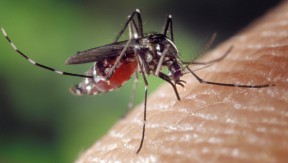The Los Angeles County Department of Public Health has confirmed five human West Nile Virus (WNV) infections in Los Angeles County, the first cases of the 2013 season. Two adults were hospitalized with neuroinvasive disease earlier this month; one had no prior medical history whereas the other was elderly with chronic health conditions not related to WNV. Both patients are recovering. Additionally, three healthy adult blood donors from mid-July were found to be infected with WNV. They have remained healthy since their donation. Donated blood is routinely screened for WNV to ensure safety of the blood supply. The patient and blood donors were from wide-ranging parts of the county including the South Bay and the San Fernando and San Gabriel Valley regions.
“We are entering the period of increased transmission of this virus that can cause serious disease,” said Jonathan E. Fielding, MD, MPH, Director of Public Health and Health Officer. “Taking a few simple precautions can greatly reduce the risk of mosquito bites, the primary pathway to human infection. West Nile can appear anywhere in Los Angeles County, or around the state, and we are urging people to take precautions, such as getting rid of pools of stagnant water around their homes, and using a repellant containing DEET when outdoors in mosquito prone areas, especially around dawn or dusk.”
In 2012, 174 human cases of WNV were reported in Los Angeles County, the second highest count documented since 2004. Of those who showed symptoms, 85% required hospitalization and 4% were fatal. As of July 19, 2013, WNV has been detected in 89 mosquito pools and 93 dead birds in Los Angeles County. Seventy-five percent of dead birds and nearly one third of mosquitoes were found in the South Bay, but WNV activity has been found in other areas across Los Angeles County. The wide-ranging distribution of our first human cases demonstrates that the virus can affect any location.
While agencies such as the Greater Los Angeles County Vector Control District and the San Gabriel Valley Mosquito and Vector Control District are actively treating areas with high mosquito populations, residents are urged to do their part. “Vector control agencies in LA County cannot do it alone. It is imperative that the public help us by minimizing the risk of being bitten and removing sources of water on their property that can breed mosquitoes. This is not a virus to take lightly,” said Kenn Fujioka, District Manager for the San Gabriel Valley Mosquito and Vector Control District. “Additionally, residents should report dead birds, and also report sources of standing water to their local vector control agencies.”
Dead birds may be reported by calling (877) 968-2473 or logging onto http://publichealth.lacounty.gov/vet/disintro.htm. Stagnant swimming pools or “green pools” should be reported to the Public Health Environmental Health Bureau at (626) 430-5200, or to a local vector control agency.
About West Nile Virus:
WNV is spread from humans through the bite of an infected mosquito; mosquitoes can become infected by biting a bird that carries the virus. Most mosquitoes do not carry the virus and most people bitten by a mosquito are not exposed to the virus. The virus is not spread through person-to-person contact, or directly from birds to humans.
In most cases, people who are infected with West Nile virus never become sick, or have only very mild symptoms that include fever, headache, nausea, body aches, and a mild skin rash. Symptoms of WNV could appear within three to 12 days after infection. Fewer than one in 150 people who are bitten by an infected mosquito become severely ill, according to the Centers for Disease Control and Prevention (CDC). In these rare cases, the virus can cause encephalitis and death. The elderly and those with weakened immune systems are most at risk for developing severe symptoms, which may require hospitalization. Recovery from any infection with the virus can take months to years and include symptoms of fatigue, malaise, and depression. There is no specific treatment for this disease.
To decrease the risk of infection:
* Avoid mosquito-infested areas at dawn and dusk.
* Wear long-sleeved shirts and long pants whenever you are outdoors.
* Repellants containing DEET, picaridin, or oil of eucalyptus, when used as labeled, are effective defenses against mosquitoes.
* Check your window screens for holes.
* Do not allow water to collect and stagnate in old tires, flowerpots, swimming pools, birdbaths, pet bowls, or other containers. These are prime breeding grounds for mosquitoes.
* Clean and chlorinate swimming pools; drain water from pool covers.
* Stock garden ponds with goldfish or other mosquito-eating fish. These eat mosquito eggs and larvae.
* Empty and wash birdbaths and wading pools weekly.
More information:
* Information on West Nile Virus by phone: (800) 975-4448.
* Information on West Nile Virus on the web: http://westnile.ca.gov/
Where to call with questions about mosquitoes: Greater Los Angeles County Vector Control District, (562) 944-9656.
The Department of Public Health is committed to protecting and improving the health of the nearly 10 million residents of Los Angeles County. Through a variety of programs, community partnerships and services, Public Health oversees environmental health, disease control, and community and family health. Public Health comprises nearly 4,000 employees and has an annual budget exceeding $750 million. To learn more about Public Health and the work we do please visit http://www.publichealth.lacounty.gov, visit our YouTube channel at http://www.youtube.com/lapublichealth, find us on Facebook at http://www.facebook.com/lapublichealth, or follow us on Twitter: @LAPublicHealth.
County Sees 2013's First Human Cases of West Nile Virus
